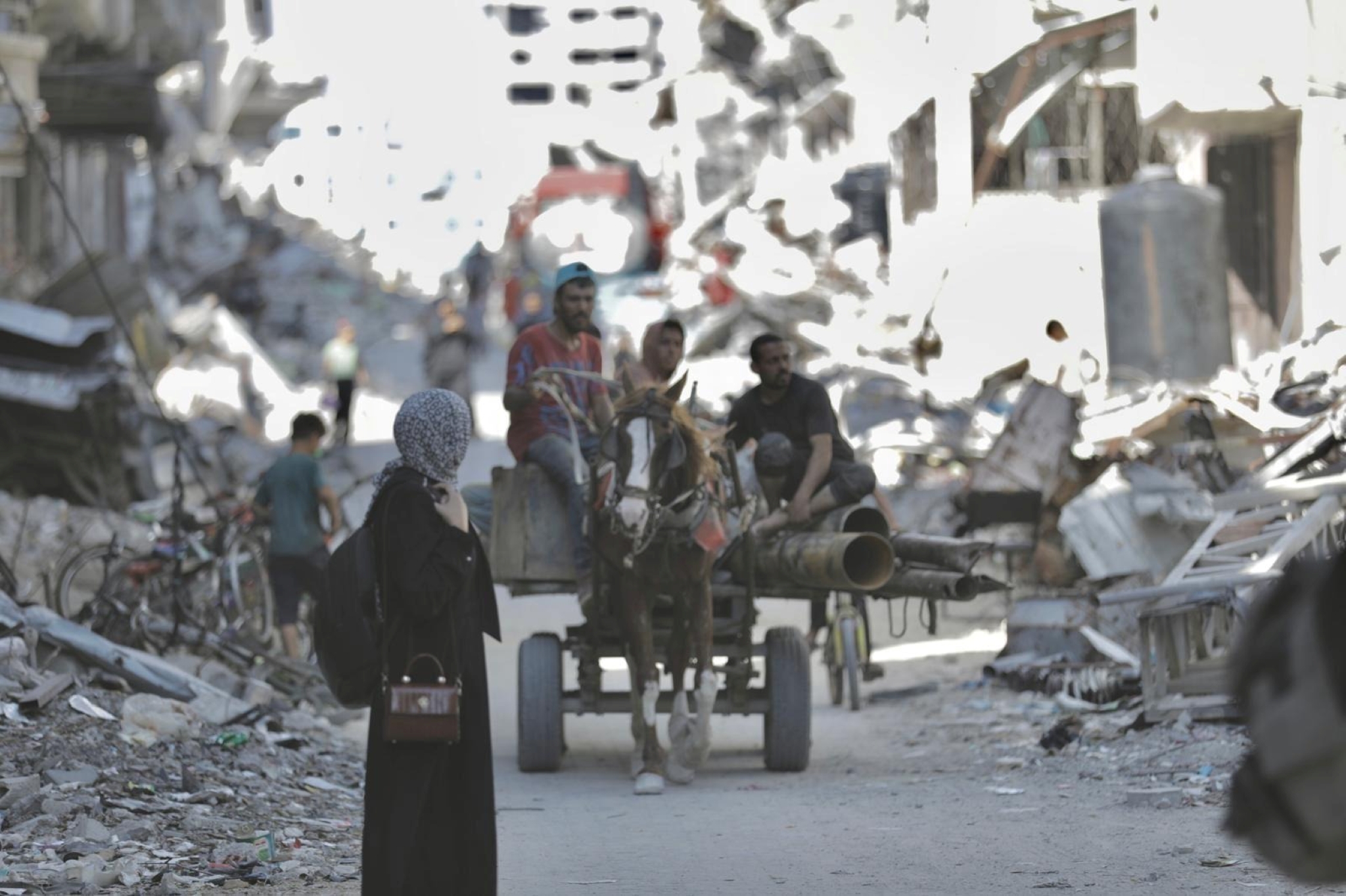Gaza, that uniquely heavy name, gives us an identity card commensurate with the intensity of our experience. It is not just a name on a map ravaged by successive seasons of war and crisis, but a city charged with layers of meaning, gathering in its alleys, squares, and ancient souks a pulse that never quiets, no matter how turbulent the seasons and how strong the scent of gunpowder.
In the rush of displacement, we drag behind us a city unlike any other, spun from the clay of the soul and fragments of lost faces. Unable to obtain a single fistful of flour, we make bread from a mixture of animal barley and birdseed, kneaded with panicked fingers under the weight of desperation and the throat of death. We watch the crumbling dough with despair, anxious for it to hold together. Every bite increases the fragility of our souls in these nights of disaster.
The path of displacement intersects with a cafe. The breathless laughter we once shared around its tables now hangs in the corners like a ghost. Our faces used to reflect back at us from the bottom of our coffee cups, our fleeting happiness spilling forth — then cut short by a farewell.
We walk through a night engulfed in bullets and countless evacuations, our feet tracing a path that chronicles Gaza’s ancient history, from the Omari Mosque, a witness to the succession of the ages, to the Samra Hammam, which has preserved its fragrance for a thousand years. Here, the neighborhood loses its identity, its letters fading from the walls of the old houses and its warmth dissipating from the emptied balconies.
I spent one night at the doors of the shops on Omar Al-Mukhtar Street, which extend from Palestine Square to the coast of Al Shati Camp. My footsteps were islands scattered across the asphalt. I felt unable to gather the fragments of our lives, scarred by loss and stained with the glow of memory. Dawn draped me in the expanse of its exiled breeze, and I slipped between the folds of my mother’s blanket, hoping it may return me to that warmth that once flowed from the kitchen oven, fragrant with the scent of Eid cookies.
Around that table, familial debates undulated. Which is tastier, maamoul stuffed with dates, or those kneaded with Turkish Delight and sprinkled with Aleppan pistachios? These memories crowded my thoughts, caressed my soul, and I found myself softly humming, “Ya laylet Eid, you brought us joy.” Indeed, it did. A deferred dream in barren days, it spins a thread of warmth no screech of bullets could sever.
Step by step, the path carried me to that old bend where the Church of Saint Porphyrius stands. A sentinel of old life in the worn alleyways. I was struck by the majesty of its interior. My heart soared through its corridors, in search of something to satiate my hunger for culture and heritage. Its walls blended with those of the Katib al-Wilaya Mosque, embroidered with threads of a brotherhood whose radiance could never die.
I turned left towards Bait Sitty and the scent of zaatar emanated from the restaurant, as if sanctifying the space with a reminder of the earth’s strength. I returned, briefly, to memories of my grandmothers during more tranquil nights. The topography of these spaces unfold as a hidden chronicle of a daily life that once was. A life where joy rested at the thresholds of these barren homes.
From Displacement to a New Legacy
This war’s intensity has only grown, dragging its cursed span to two full years. Our steps are urgent. We hurry westward in search of some fleeting shelter. The scent of Badri and Hania coffee drifts through al-Rimal and memories rise like little promises, urging our souls to endure, igniting inside of us the flame of living, of belonging. Displacement carries us next to the seashore and the Monir Abu Hasira Fish Market — a temporary end to our traverse. Here, the heavy question, “Where to now?” fades into the still familiar scent of grilled fish.
The devastation in Gaza expands. The meaning of home is cast and recast with each ensuing demolition. When the ancient walls of Souq al-Zawiya collapse, when the grapevines of Sheikh Ajlin are uprooted, when a childhood home is torn down, or an entire neighborhood is erased, images of the devastation leap and refract, redrawing the maps that our memory carved onto the fragile surface of our heart long ago. The ruins impose upon us a new history, one that is both more alive and more violent.
Despite the scale of the destruction, our recollections endure. Our memory fortifies Gazan’s spirit in times of loss. When the absent picture of our destroyed city overwhelms us, images of the old days grip our souls and we find ourselves back in the evening glow of Palestine Square. The smells of al-Souda’s baked goods and Tayem’s sweets — those famous pastries enriched with clarified butter — return us to the echoes of laughter that once beat inside Gaza’s Square of the Unknown Soldier, whose marble held the secrets of our first sacrifices and the ember of that ever-lasting question.
These walks brim with traces of everything. An echo where all the years of our lives are felt until, suddenly, we are returned to the present, to nothingness. It is here where longing ferments, granting memory the strength to sustain the ruin. This memory carries us, through changing faces and shifting maps, to the beginning of a new inheritance. A certainty; the contours of our home will remain, no matter how far exile takes us in the western part of Gaza City.
Engy Abdelal is a journalist from Gaza. This is an excerpt from a series of diary entries she wrote during the genocide while she and her family were in the throes of displacement.


